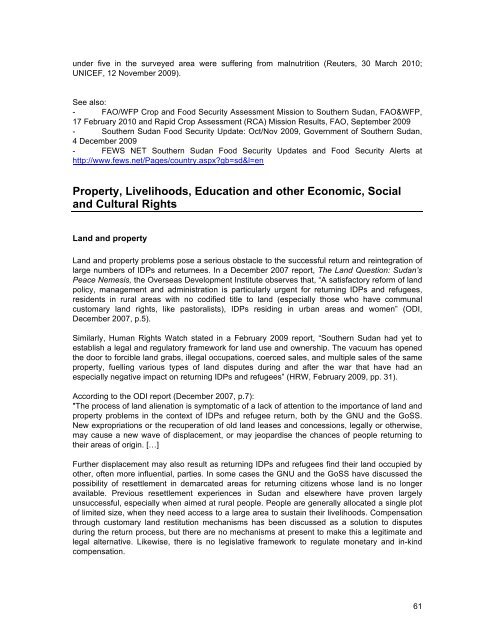SUDAN: Durable solutions elusive as southern IDPs return and ...
SUDAN: Durable solutions elusive as southern IDPs return and ...
SUDAN: Durable solutions elusive as southern IDPs return and ...
Create successful ePaper yourself
Turn your PDF publications into a flip-book with our unique Google optimized e-Paper software.
under five in the surveyed area were suffering from malnutrition (Reuters, 30 March 2010;<br />
UNICEF, 12 November 2009).<br />
See also:<br />
- FAO/WFP Crop <strong>and</strong> Food Security Assessment Mission to Southern Sudan, FAO&WFP,<br />
17 February 2010 <strong>and</strong> Rapid Crop Assessment (RCA) Mission Results, FAO, September 2009<br />
- Southern Sudan Food Security Update: Oct/Nov 2009, Government of Southern Sudan,<br />
4 December 2009<br />
- FEWS NET Southern Sudan Food Security Updates <strong>and</strong> Food Security Alerts at<br />
http://www.fews.net/Pages/country.<strong>as</strong>px?gb=sd&l=en<br />
Property, Livelihoods, Education <strong>and</strong> other Economic, Social<br />
<strong>and</strong> Cultural Rights<br />
L<strong>and</strong> <strong>and</strong> property<br />
L<strong>and</strong> <strong>and</strong> property problems pose a serious obstacle to the successful <strong>return</strong> <strong>and</strong> reintegration of<br />
large numbers of <strong>IDPs</strong> <strong>and</strong> <strong>return</strong>ees. In a December 2007 report, The L<strong>and</strong> Question: Sudan’s<br />
Peace Nemesis, the Overse<strong>as</strong> Development Institute observes that, “A satisfactory reform of l<strong>and</strong><br />
policy, management <strong>and</strong> administration is particularly urgent for <strong>return</strong>ing <strong>IDPs</strong> <strong>and</strong> refugees,<br />
residents in rural are<strong>as</strong> with no codified title to l<strong>and</strong> (especially those who have communal<br />
customary l<strong>and</strong> rights, like p<strong>as</strong>toralists), <strong>IDPs</strong> residing in urban are<strong>as</strong> <strong>and</strong> women” (ODI,<br />
December 2007, p.5).<br />
Similarly, Human Rights Watch stated in a February 2009 report, “Southern Sudan had yet to<br />
establish a legal <strong>and</strong> regulatory framework for l<strong>and</strong> use <strong>and</strong> ownership. The vacuum h<strong>as</strong> opened<br />
the door to forcible l<strong>and</strong> grabs, illegal occupations, coerced sales, <strong>and</strong> multiple sales of the same<br />
property, fuelling various types of l<strong>and</strong> disputes during <strong>and</strong> after the war that have had an<br />
especially negative impact on <strong>return</strong>ing <strong>IDPs</strong> <strong>and</strong> refugees” (HRW, February 2009, pp. 31).<br />
According to the ODI report (December 2007, p.7):<br />
"The process of l<strong>and</strong> alienation is symptomatic of a lack of attention to the importance of l<strong>and</strong> <strong>and</strong><br />
property problems in the context of <strong>IDPs</strong> <strong>and</strong> refugee <strong>return</strong>, both by the GNU <strong>and</strong> the GoSS.<br />
New expropriations or the recuperation of old l<strong>and</strong> le<strong>as</strong>es <strong>and</strong> concessions, legally or otherwise,<br />
may cause a new wave of displacement, or may jeopardise the chances of people <strong>return</strong>ing to<br />
their are<strong>as</strong> of origin. […]<br />
Further displacement may also result <strong>as</strong> <strong>return</strong>ing <strong>IDPs</strong> <strong>and</strong> refugees find their l<strong>and</strong> occupied by<br />
other, often more influential, parties. In some c<strong>as</strong>es the GNU <strong>and</strong> the GoSS have discussed the<br />
possibility of resettlement in demarcated are<strong>as</strong> for <strong>return</strong>ing citizens whose l<strong>and</strong> is no longer<br />
available. Previous resettlement experiences in Sudan <strong>and</strong> elsewhere have proven largely<br />
unsuccessful, especially when aimed at rural people. People are generally allocated a single plot<br />
of limited size, when they need access to a large area to sustain their livelihoods. Compensation<br />
through customary l<strong>and</strong> restitution mechanisms h<strong>as</strong> been discussed <strong>as</strong> a solution to disputes<br />
during the <strong>return</strong> process, but there are no mechanisms at present to make this a legitimate <strong>and</strong><br />
legal alternative. Likewise, there is no legislative framework to regulate monetary <strong>and</strong> in-kind<br />
compensation.<br />
61
















